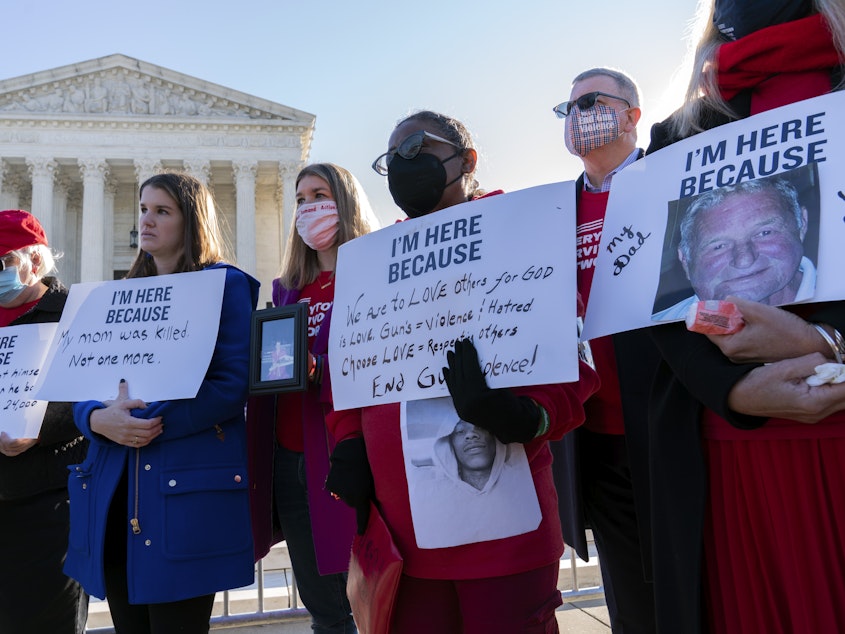Supreme Court appears skeptical of New York's restrictive gun-control law

Updated November 3, 2021 at 3:52 PM ET
At the U.S. Supreme Court, the conservative majority seemed ready Wednesday to broaden gun rights by striking down a New York law that limits the right to carry concealed handguns. Some 80 million people live in states that, like New York, limit concealed carry.
In 2008, the court ruled for the first time that the Second Amendment right to keep and bear arms guarantees individuals the right to have a gun at home for self defense. The question Wednesday was how far state and local governments may go in regulating whether an individual may carry a gun outside the home.
At issue was New York's law restricting licenses to carry to people going hunting or shooting, or to those who can demonstrate a special need for self protection, like a bank messenger carrying cash.
Lawyer Paul clement, representing those challenging the law, told the court the statue is blatantly unconstitutional because if treats the right to bear arms as a privilege, not a constitutional right.
Sponsored
He got plenty of pushback from the court's liberals, and some from Chief Justice Roberts. Could a university ban guns from the campus? Clement dodged the question, suggesting that most campuses are open to the public. The chief justice pressed further.
"Well, what sort of place do you think they could be excluded from?" Roberts asked. "In other words, you can get a permit, but the state can impose certain restrictions, for example, any place in which alcohol is served. Can they say you cannot carry your gun at any place where alcohol is served?"
Justice Kagan jumped in: What about subways and ballparks? Justice Barrett asked about Times Square on New Year's Eve. Clement demurred, saying that these examples would have to be worked out on a case-by- case basis. Justice Breyer wasn't satisfied: "I think that people of good moral character who start drinking a lot and who may be there for a football game or — or some kind of soccer game can get pretty angry at each other. And if they each have a concealed weapon, who knows?" he said. "What are we supposed to say in your opinion that is going to be clear enough that we will not produce a kind of gun-related chaos?"
Clement's answer to such questions was this: "At the end of the day, I think what it means to give somebody a constitutional right is that they don't have to satisfy a government official that they have a really good need to exercise it or they face atypical risks."
But if Clement got some pushback, it was nothing like what New York Solicitor General Barbara underwood got.
Sponsored
The chief Justice pointed to the court's landmark decision in 2008 based on the right to self defense. And he suggested that having a gun for self defense may be more important in densely populated areas than it is rural areas.
"Well, how many muggings take place in the forest?" he asked Underwood.
Justice Alito spoke about people who work late at night in Manhattan, people who clean offices, a nurse, an orderly, a dishwasher, and when they have to walk to a subway or bus stop or walk home, "they are scared to death," as he put it, and they apply for a license.
"They do not get licenses, is that right?" he asked Underwood.
She replied: "That is in general right, yes. If there's nothing particular to them, that's right."
Sponsored
"But how is that consistent with the core right to self-defense, which is protected by the Second Amendment?" Alito countered.
At the end of the day, there seemed to be little doubt that a conservative majority will strike down New York's law. Only Justice Amy Coney Barrett did not telegraph her view.
The unanswered question remains just where the court will allow guns to be banned in the future--the subway, the ballpark, places that serve liquor, large protests? That was not clear. And it's entirely possible the Supreme Court won't answer those questions in this case. [Copyright 2021 NPR]



